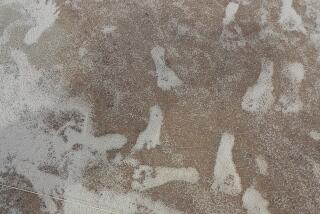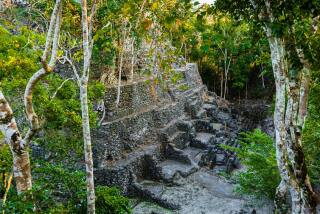Ruins in Peru May Date to AD 400 : U.S. Team to Explore Ancient Andes City
BOULDER, Colo. — An American archeological team will launch an expedition through a remote South American rain forest to initiate a study of an ancient Andean city.
The University of Colorado said it had signed two agreements with the government of Peru for exclusive rights to dig at the site, visited last July by four men from Boulder. The archeologists will share their findings with the Peruvian government.
Friday, the university released pictures taken recently at the site.
The city is the remains of a civilization that may date to AD 400. The Boulder residents reported finding it in July, after a 10-day trek that took them across a 14,000-foot pass in the eastern Andes Mountains.
Inaccessibility and the fact the site receives 120 to 230 inches of rain a year had prevented work at the 80-acre city--called Gran Pajaten--in the Rio Abiseo National Park.
“No one has scientifically addressed this civilization. You could not ask for a more important project,” said Thomas Lennon, an anthropologist who went on the July expedition.
He was alerted to it when Alan Stormo, who was vacationing in Peru, read a 20-year-old newspaper story of work at the site. Stormo interested two of his friends, and they convinced Lennon of the historical significance of the find.
The four brought back photographic evidence of 18 buildings, several burial towers, well-preserved pottery and other artifacts from the site.
Dr. Stan Benton nearly lost his life on the July trek, when he slipped and fell into a rock-strewn river 35 feet below a walkway.
University officials said it would take a concerted effort for 15 years to fully explore the ruins.
No one knows what happened in Gran Pajaten, but it is believed that the people were swept by disease brought to South America by Spanish conquerors.
The burial towers, observed without digging, showed elaborate carvings that could hold some key to the death of the civilization.
More to Read
Sign up for Essential California
The most important California stories and recommendations in your inbox every morning.
You may occasionally receive promotional content from the Los Angeles Times.










